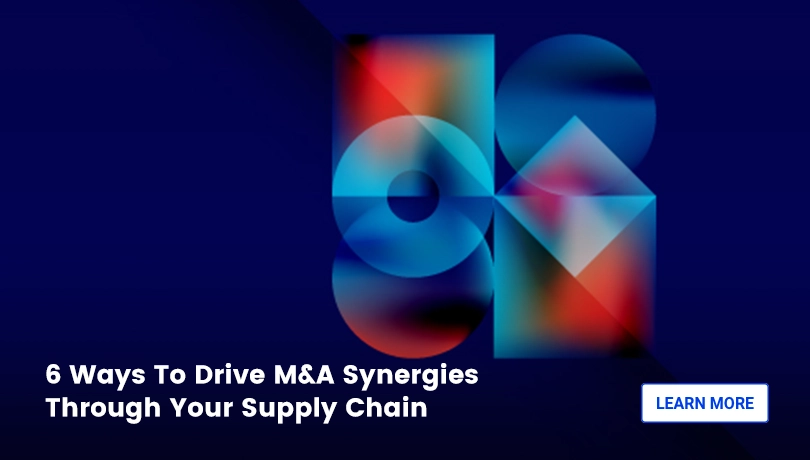Navigating mergers and acquisitions (M&A) and divestitures requires a specialized approach. At GEP, we understand the challenges businesses face — from spend harmonization and clean-room data handling to vendor and contract management.
Our strength lies in identifying synergy savings and facilitating a frictionless merger of people, processes and technology to achieve seamless integration, sustainable synergy and market expansion.
We leverage AI-powered software, strategic consulting and a dedicated team to drive digital transformation and maximize M&A value so that the merged entity thrives.
M&A Consulting Services for High-Impact Value
Our Integration Management Office ensures seamless collaboration and strategic alignment from initial due diligence to post-merger integration, helping unlock value from day one.
Secure Clean Rooms
We help set up secure cloud-based environments for safe, efficient information exchange between the merging entities. Our AI-enhanced clean rooms ensure compliance and speed without sacrificing security.
Rapid Synergy Execution
GEP deploys seasoned experts and AI-first software to identify procurement and operational synergies. Our tailored approach speeds up impact and delivers quick wins.
Organizational Design
We develop and implement a new blueprint for procurement and supply chain that aligns with strategic business goals, ensuring the right capabilities are in place from day one.
Divestiture Strategy and Execution
GEP supports enterprises through strategic divestitures, optimizing operational transitions to preserve value and ensure business continuity.
Post-Merger Capability Building
We equip clients with skills and tools needed to build a robust, unified company culture and operational framework, ensuring sustainable success for the new enterprise.
ESG Impact Acceleration
GEP helps aggregate emissions baseline data, identify synergy opportunities to reduce emissions, streamline contracts and rationalize vendors to meet ESG targets.
Unlock M&A Success With GEP's Proven Expertise
GEP’s deep M&A experience and AI-driven strategies deliver tangible results across industries. From synergy assessments to advanced technology integration, we ensure sustainable growth for your business.
Why Choose GEP
- Broad M&A experience: Our rich M&A expertise spans industries and deal types
- End-to-end expertise: We consider risks, implications and best practices across the M&A lifecycle
- AI-first strategy: Contract analysis and supplier/contract/terms synergies
- Sustainable M&A capabilities: We empower clients to build lasting internal M&A capabilities for future success
- Holistic M&A results: Our extensive knowledge across disciplines ensures strategies lead to real-world outcomes
- Advanced technology integration: Our technology framework supports project management, including AI synergy assessment, execution and risk management as well as AI-enabled clean room platforms to enhance M&A outcomes
- Pragmatic implementation: Decades of experience has refined our transformation plans to guarantee impactful results
- Deep industry insights: We tap into our global network of experts across various industries, ensuring your M&A strategy not only succeeds but also provides a competitive advantage
Our Track Record
- Established a clean room and governance model for a large international packaging company defining unified spend taxonomy with AI classification and delivering over $120 million in savings across categories.
- Developed a synergy assessment and execution plan across various service categories for a global manufacturing and pharma company, achieving over 7% in savings and ensuring business continuity during transition.
- Integrated people, process, technology and governance for a top chemicals company, creating a $250 million synergy savings road map over 18 months, including 68% supplier consolidation.
- Accelerated synergy capture for a specialized biopharma company, managing over $10 billion in annual spend and delivering $500 million in savings over three years, achieving 15x return on investment.
- Managed the divestment of a large business unit for a global agrochemicals company, separating 7,000+ contracts, establishing risk management processes and delivering $55 million in de-synergies within six months.
Frequently Asked Questions
M&A (mergers and acquisitions) consultants play a crucial role in guiding companies through complex business combinations and transactions. These are specialized professionals who serve as strategic advisors throughout the entire M&A lifecycle — bringing expertise, objectivity and industry knowledge to the transformative process.
The primary responsibilities of M&A consultants include:
Strategic Planning: M&A consultants help companies identify acquisition targets or potential merger partners that align with their strategic objectives. They assist in developing comprehensive M&A strategies that support broader business goals — for market expansion, vertical integration, and even diversification.
Due Diligence: They conduct thorough evaluations of target companies, examining financial statements, operations, legal issues, tax implications, and potential synergies or risks. This critical assessment helps clients make informed decisions and avoid costly mistakes.
Valuation: M&A consultants use numerous financial models to arrive at appropriate valuations for target companies, analyzing factors such as earnings potential, market position, assets, and competitive landscape to establish fair purchase prices.
Deal Structuring: They advise on optimal transaction structures, considering tax implications, regulatory requirements, and risk allocation between parties. They also provide guidance on payment terms as well as other deal components.
Negotiation Support: Consultants provide valuable support during negotiations, helping clients secure favorable terms while maintaining positive relationships with counterparties. They can serve as intermediaries to facilitate productive discussions.
Integration Planning: Post-merger integration is where unifying the two entities takes place. M&A consultants develop detailed integration plans — covering organizational structure, systems, processes, and culture — to maximize synergies and minimize disruption.
Change Management: There are human aspects of M&A that the consultants help manage, helping address workforce concerns, cultural differences, and communication challenges that arise during transitions.
Regulatory Compliance: M&A consultants ensure that transactions comply with relevant regulations and antitrust laws, working alongside legal teams to obtain necessary approvals.
By leveraging their specialized expertise and objective perspective, M&A consultants help companies navigate complex transactions while minimizing risks and maximizing value creation. Their involvement often proves crucial to successful outcomes in what are typically high-stakes, transformative corporate events.
Unlike the rest, M&A consultants possess specialized expertise and have a unique position in the transaction ecosystem. Several key factors differentiate them, including:
Cross-functional Integration: M&A consultants can integrate financial, strategic, operational, and organizational perspectives, bridging gaps between investment bankers, lawyers, accountants, and management teams, creating cohesive transaction processes.
Deep Industry Knowledge: Specialized M&A consultants bring sector-specific insights that generalist advisors may lack. This industry expertise helps enterprises identify unique synergy opportunities, anticipate regulatory challenges, and understand competitive dynamics.
Implementation Focus: Unlike deal-oriented advisors who typically exit after closing, M&A consultants often remain involved through implementation. Their continuity through post-merger integration ensures that strategic objectives materialize into operational realities.
Value Creation: M&A consultants concentrate on realizing synergies and sustainable value rather than just transaction mechanics. They help clients identify untapped potential and develop concrete plans to capture identified benefits.
Change Management: They bring specialized capabilities in managing organizational transitions, cultural integration, and stakeholder communications that purely financial advisors might overlook.
The complex blend of strategic vision, execution capability, and objective guidance makes M&A consultants invaluable partners for enterprises navigating transformative transactions, particularly those seeking to maximize value beyond the deal closing.
Mergers and acquisitions are undertaken primarily to create value. But many M&A transactions fail to deliver the expected results. This is a high-stakes environment and precisely why organizations turn to specialized M&A consultants. Their expertise can mean the difference between a transformative success and a costly misstep.
Risk Mitigation: M&A transactions involve significant financial commitment and organizational disruption. But experienced consultants can identify potential pitfalls through comprehensive due diligence, helping companies avoid costly mistakes or overvaluation. Their objective assessment can prevent erroneous decision-making.
Specialized Expertise: M&A consultants rely on proven methodologies, analytical frameworks, and industry benchmarks developed across numerous transactions. This expertise extends beyond financial considerations to regulatory compliance, cultural integration, and operational synergies.
Resource Optimization: Executing mergers and acquisitions requires extreme focus while maintaining day-to-day business operations. Consulting firms provide dedicated resources that prevent operational disruption, allowing leadership teams to balance transaction needs with ongoing business management.
Accelerated Timelines: Experienced consultants streamline transaction processes through established workflows, reducing time-to-close and time-to-value. Their efficiency helps maintain deal momentum while ensuring thorough evaluation.
Negotiation Advantage: M&A consultants strengthen negotiating positions through market insights, comparable transaction data, and valuation expertise. Their involvement often results in more favorable terms and appropriate risk allocation.
Integration Excellence: Post-merger integration presents numerous challenges that determine ultimate transaction success. Consultants provide structured integration approaches, addressing culture clashes, redundancies, and system incompatibility that might otherwise derail value creation.
Objectivity: External consultants offer unbiased perspectives, free from preconceptions. This objectivity is particularly valuable when evaluating strategic fit, identifying synergies, or making difficult consolidation decisions.
By leveraging M&A consultants' specialized expertise, companies can significantly enhance their probability of transaction success, ultimately delivering the shareholder value and strategic advantages that motivated the deal in the first place.
Initiating a successful M&A target search requires a methodical approach that balances strategic vision with analytical rigor. Every industry has some variations in the way they function at the business level and hence different approaches are required, but there are some typical steps that enterprises can take to launch an effective acquisition search process, including:
1. Define Strategic Acquisition Criteria: Start by establishing the strategic rationale driving your acquisition initiative. Articulate specific objectives such as market expansion, vertical integration, technological acquisition, or diversification. Develop comprehensive acquisition criteria including target size parameters, geographic focus, ownership preferences, and performance metrics. This framework should directly connect to your enterprise’s broader growth strategy and address specific capability gaps or market opportunities.
2. Establish Target Industry Parameters: Next, identify specific industry segments that align with your strategic objectives. Define relevant industry classifications, conduct market sizing analysis, assess competitive landscapes, and evaluate growth trajectories. Consider factors such as industry maturity, consolidation opportunities, regulatory environment, and margin characteristics. Effective searches narrow focus to segments with evident strategic fit rather than casting an overly broad net.
3. Develop a Multi-channel Sourcing Strategy: Create a diversified approach to identifying potential targets through complementary channels. Engage with investment banks and M&A advisors, leverage industry-specific databases, activate professional networks, conduct proprietary outreach. Furthermore, use tailored messaging that conveys your acquisition idea while protecting strategic intentions. Establish tracking mechanisms to monitor sourcing effectiveness across channels.
4. Implement Preliminary Screening Process: Design an efficient screening methodology that applies your acquisition criteria to potential targets. Balance quantitative factors (financial thresholds, growth rates, etc.) with qualitative considerations (cultural compatibility, strategic alignment, etc.). Develop standardized evaluation templates for consistent assessment across opportunities. Establish clear decision rights and escalation paths for moving targets through the screening funnel.
5. Assemble the Deal Team: Form a cross-functional team with defined roles for target evaluation and outreach. Include corporate development, finance, operations, legal, and relevant subject matter experts. Establish communication protocols, decision-making frameworks, and confidentiality safeguards. Engage external advisors (transaction attorneys, due diligence providers, etc.) at appropriate stages to supplement internal capabilities.



















